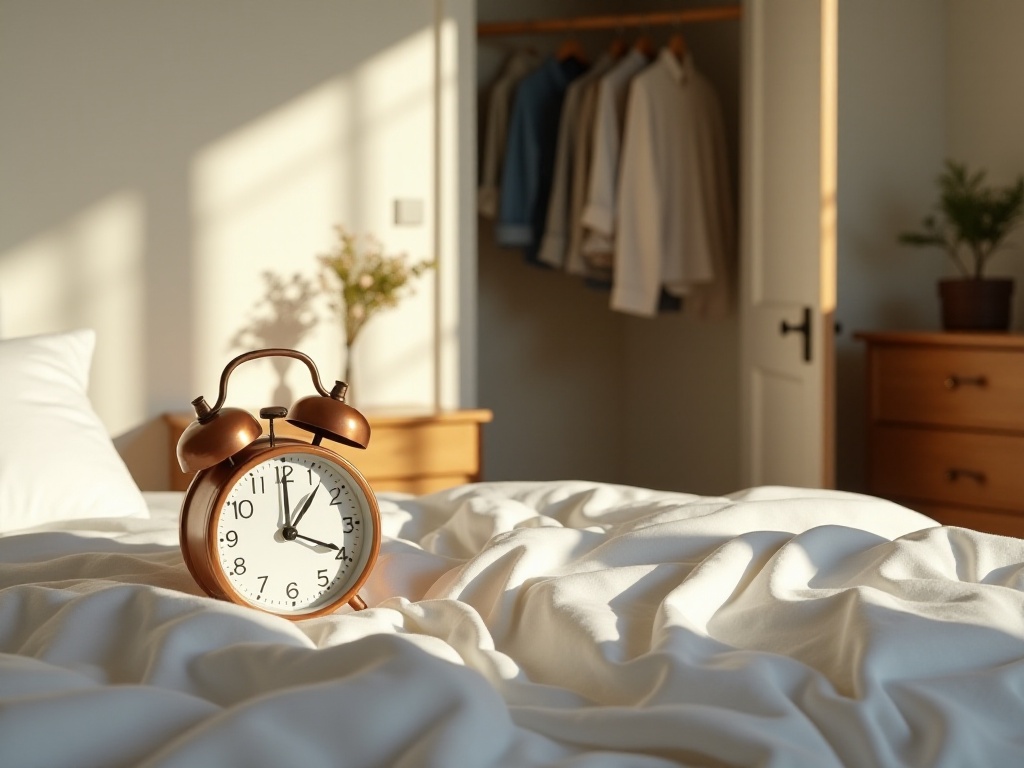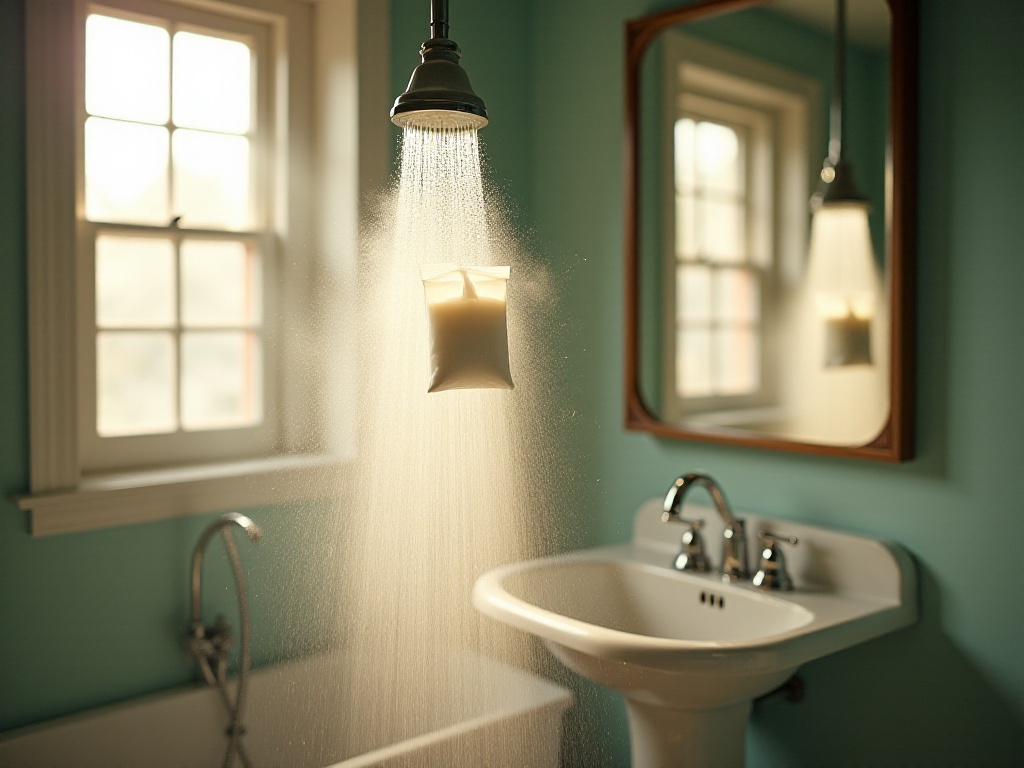Opening Words
Lying in bed scrolling through my phone, watching the sky darkening outside, I can't help but think of myself a year ago. Back then, just like you who might be watching short videos and reluctant to sleep now, I was fighting an epic battle with my bed every day. Hitting snooze more than ten times was nothing unusual, and my phone was filled with alarm names ranging from "Maximum Morning Rage" to "Last One, Really." Often, I would turn off the alarm with my eyes closed, only to wake up realizing I had overslept again, rushing out the door in a panic, with breakfast being completely out of the question.
But now, I've maintained a stable routine of waking up at 6 AM for almost a year. Not only do I avoid being late, but I can also enjoy leisurely morning moments, watch the sunrise, have a cup of coffee, and plan my day. This change feels incredible even to me, so today I'd like to share my journey with you.
Pain Points Analysis
I believe many of you are just like my former self, absolutely detesting the idea of early rising. Every night you firmly decide to wake up early the next day, but you still end up staying in bed until the last possible moment. Sometimes you might even do inexplicable things, like muting the alarm while half-asleep, or finding various excuses to sleep "just five more minutes."
The consequences of this vicious cycle are terrible. First, you're always rushed, leading to a very careless morning routine. Makeup? You're lucky if you can draw your eyebrows. Breakfast? A banana will have to do. What's worse is that because of poor breakfast habits, you tend to overeat at lunch, which can easily lead to weight gain.
Most frustrating is how this rushed state affects your mood for the entire day. You feel foggy, work efficiency suffers, you start getting sleepy in the afternoon, have to work overtime when you get home, then go to bed late, and can't wake up the next day... It's an endless cycle you can never seem to break.

The Turning Point
The turning point came last September. While watching videos, I stumbled upon a share about "minimalist morning rituals." To be honest, I was skeptical at first. After all, those "life guru" advice online always sounds good but is often hard to maintain in practice.
But this "minimalist morning ritual" caught my attention. It wasn't one of those motivational posts telling you to wake up at 4 AM and meditate for two hours, but rather offered many practical small suggestions. For example, placing the alarm clock where you need to get up to reach it; preparing clothes for the next day before bed; creating a simple morning routine, and so on.
Most importantly, this method emphasized gradual progress. It told us not to expect to completely change our sleep schedule overnight, but rather to slowly develop new habits over 21 days. This practical attitude really moved me, so I decided to give it a try.

Core Secrets
Through this period of practice, I've summarized several key secrets. The first is thoroughly solving the problem of hitting snooze and going back to sleep. I now charge my phone on the desk, in a spot that requires walking several steps to reach. The benefit is that by the time you groggily walk to the desk, your body has started moving and your brain has begun functioning.
I also discovered an interesting phenomenon: when you know the alarm is far away, your subconscious takes it more seriously. Unlike before when the phone was by your pillow, where you always felt you could easily turn it off, making it easier to compromise. Now, because you have to move, you often naturally wake up before the alarm, as your body has adapted to this biological clock.
Besides this, I set myself an iron rule: absolutely no second alarm. Many people like to set multiple alarms, thinking it's safer. But in reality, this weakens your willpower. Because you know there are backup alarms, it's particularly easy to indulge yourself. Now I only use one alarm, and when it rings, I must get up, no negotiation.

Advance Preparation
To wake up smoothly in the morning, evening preparation cannot be neglected. I now generally start preparing for the next day around 10 PM. First is selecting clothes to wear, including all small items like underwear and socks. Work-related files, laptop, chargers, and other items are also packed in my bag.
This not only saves time in the morning but more importantly reduces mental load on your brain. Think about it, if you have to coordinate outfits and find various items in the morning, you'll feel particularly anxious. And often the more rushed you are, the more likely you are to make mistakes, wanting to turn your room upside down when you can't find something.
I've also developed a habit of spending 5 minutes before bed reviewing the next day's schedule in my head. What meetings to attend, what materials to prepare, who to have lunch with, and so on. This gives you a clear expectation of the next day's arrangements and helps you sleep more soundly.

Ritual Enhancement
Speaking of morning rituals, many might think this term sounds particularly grand. Actually, it's not - ritual can start from very small things. For example, I now make making the bed my first task of each day. This action seems simple but has profound significance.
First, making the bed gives you a sense of accomplishment from completing a task. When you see a neatly made bed, you get a sense of ritual that "a new day has begun." Second, the action of making the bed itself requires you to move your body, helping you wake up faster. Finally, a tidy bed can give you a good mood, and this positive emotion will affect your state throughout the day.
Besides making the bed, my morning ritual includes drinking water, simple stretching exercises, and meditation. These actions aren't complicated, each step only takes about 3-5 minutes, but these simple actions can prepare your body and mind for the new day.
Space Layout
The topic of space layout might sound a bit professional, but it's really just about putting frequently used items in the most convenient places. My room is now arranged with particular attention to efficiency, with the position of each item carefully thought out.
For example, I keep a large water bottle on the bedside table, so I don't have to specifically go get water when I'm thirsty at night or when I wake up in the morning. There's a comfortable pair of slippers by the bed, positioned exactly where my feet can reach when getting out of bed. The curtains are also chosen for good light blocking, so night lights won't affect sleep, and sudden sunlight won't wake me up in the morning.
Items on the desk are also arranged according to frequency of use. Frequently used stationery and notebooks are within arm's reach, while less frequently used items are stored in drawers. This not only improves efficiency but also makes the entire space look more neat and orderly.
Storage Revolution
Speaking of storage, this is definitely an important aspect of improving life quality. My current storage philosophy is: it's not about how many things you have, but being able to find them. Every item has its fixed place, and is immediately returned after use, never just put down randomly.
For example, all my socks are now the same style, so I don't have to spend time matching them every morning. Clothes are also categorized by occasion and season, with work clothes, sports clothes, and loungewear stored in different areas. Jewelry and accessories are also organized in storage boxes, with each compartment labeled with the item name.
These storage habits might seem a bit obsessive, but they really can save you a lot of time. Moreover, when your life becomes well-organized, your entire mood becomes particularly pleasant.

Practical Insights
After 21 days of practice, I found that the biggest feature of this method is its strong operability. It doesn't require you to become a completely different person at once, but rather cultivates new habits through small changes.
For instance, I started just by placing the alarm clock farther away to ensure I could wake up on time. Once this habit was established, I gradually added making the bed and drinking water. Later came morning exercise and meditation. Each new habit was only cultivated after the previous one was stable.
This gradual approach is particularly suitable for those of us who were once heavy sleepers. Because it doesn't put too much pressure on you, each small goal is achievable. When you complete a small goal, you feel a sense of achievement, and this positive feedback encourages you to continue persevering.
Through these 21 days of practice, my quality of life has indeed improved significantly. Not only can I arrive at work on time every day, but I can also leisurely enjoy breakfast. Because I wake up early, work efficiency has also improved, and I don't need to work overtime late. I have more time in the evening to do things I enjoy, and my whole life rhythm has become very regular.
Conclusion and Outlook
Looking back now, developing an early rising habit isn't actually such a difficult thing. The key is finding the method that suits you and sticking to it. If you're currently struggling with waking up early, why not try these tips I've shared.
Remember, change doesn't need to happen overnight; what's important is taking the first step. Maybe at first you can only manage to place your alarm clock farther away, but that's already a good start. As time passes, you'll slowly discover that waking up early isn't so scary, and it can actually bring you many unexpected gains.
Finally, I want to say that everyone's situation is different, and the methods I've shared might not be 100% suitable for you. You can make some adjustments based on your specific situation during practice, finding the early rising method that works best for you.
If you also have some effective early rising techniques, welcome to share them in the comments. After all, everyone is a unique individual, and your experience might help other friends who are trying hard.
My next article will share how to create an efficient and comfortable home environment, interested friends remember to follow me. Let's continue advancing together on the path of improving life quality!







